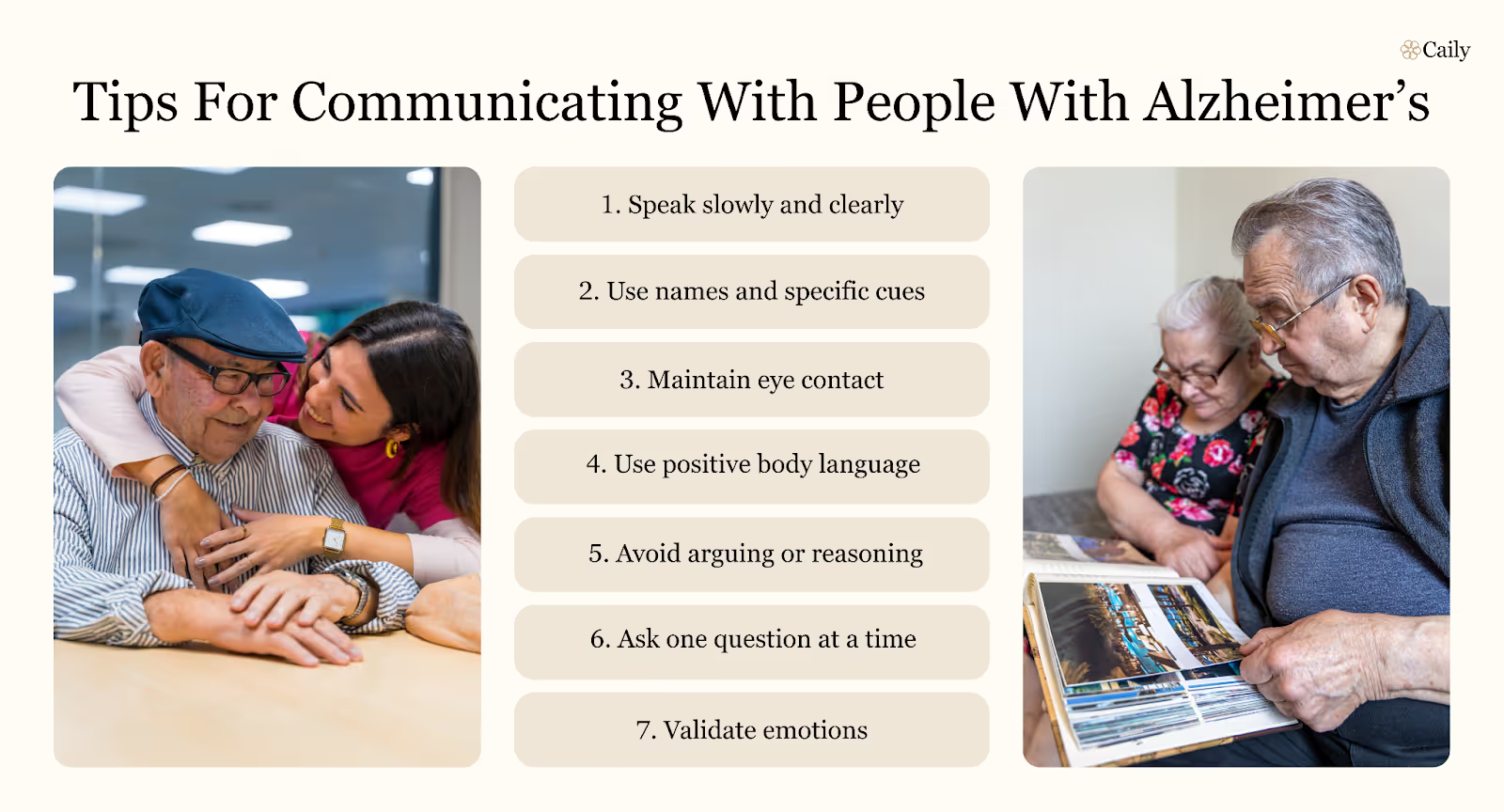Alzheimer’s and Brain Awareness Month: Empowering Caregivers

June is Alzheimer’s and Brain Awareness Month, a time dedicated to raising awareness about Alzheimer’s disease, supporting caregiver communities, and highlighting the importance of brain health. Nearly 12 million Americans provide unpaid care for a family member or friend with dementia, according to the Alzheimer’s Association. For millions of families and caregivers, this month presents an opportunity to reflect, educate, and take action.
Caring for someone with Alzheimer’s begins with understanding, both for the disease itself and the daily realities of cognitive decline. For family members, healthcare aides, and adult children alike, this knowledge is crucial in offering meaningful support and preserving connections. This blog covers the key facts you need to know, practical dementia caregiving tips, and ways to stay involved during this important month.
Understanding Alzheimer’s and Brain Health
Supporting a loved one with Alzheimer’s requires insight into how the disease changes the brain over time and how those changes influence daily behavior and decision-making. Unfortunately, common myths, such as “Alzheimer’s and dementia are the same,” “only older adults get Alzheimer’s,” or “vaccines increase the risk,” can create confusion and fear. Read on to understand the realities of Alzheimer's, the signs, and how to support a healthy brain.
What is Alzheimer’s disease?
According to the National Institute of Aging, Alzheimer’s disease is “the most common form of dementia, a brain disorder that slowly destroys a person’s memory and thinking skills. It is characterized by a loss of cognitive functioning — thinking, remembering, and reasoning — and behavioral abilities to such an extent that it interferes with a person’s daily life and activities.” Those diagnosed will eventually lose the ability to complete basic everyday tasks, like dressing or standing.
About 1 in 9 people age 65 and older have Alzheimer’s. While there is currently no cure, available medications can help manage symptoms and may slow the progression of the disease. Ongoing research continues to explore new strategies for prevention and treatment. Early detection and consistent support are key to enhancing quality of life for both those diagnosed and the caregivers who support them.
Signs of Alzheimer’s Disease
Recognizing how Alzheimer’s disease progresses over time enables caregivers to better prepare for shifting needs and provide the proper support along the way. Symptoms generally develop in three distinct stages: mild, moderate, and severe.
Symptoms of Mild Alzheimer’s Disease
In the mild stage, changes are subtle and may be mistaken for the normal aging process.
- Frequently misplacing items or forgetting recent events
- Difficulty recalling names or finding the right words
- Getting lost in familiar places
- Trouble with planning or problem-solving
- Withdrawing from work or social activities
- Noticeable lapses in judgment or decision-making
- Increased anxiety or mood/personality changes
Symptoms of Moderate Alzheimer’s Disease
During the moderate stage, symptoms become more obvious and interfere with daily life.
- Increased memory loss and confusion
- Difficulty performing routine tasks like cooking or managing finances
- Disorientation with time and place
- Changes in sleep patterns and personal hygiene
- Mood swings, agitation, or inappropriate emotional outbursts
- Moments of confusion about loved ones
Symptoms of Severe Alzheimer’s Disease
In the severe stage, individuals become fully dependent on others for care.
- Loss of ability to communicate clearly
- Inability to recognize loved ones
- Difficulty walking, sitting, or swallowing
- Incontinence and loss of motor skills
- Vulnerability to infections like pneumonia
- Full-time care is required for safety and comfort
Reducing the Risk of Alzheimer’s and Dementia
Your brain is the control center for everything your body does, from movement and memory to emotions and decision-making. That’s why brain health awareness is so important. By understanding how to support brain health, you can take proactive steps to slow cognitive decline and reduce your risk of developing Alzheimer’s or other forms of dementia. While aging increases the risk, Alzheimer’s is not a natural or inevitable part of getting older. Instead, it results from a combination of genetic, lifestyle, and environmental factors.
You can support long-term brain function by focusing on:
- Eat a brain-healthy diet: Nutrient-rich foods can play a big role in cognitive function. Diets like the Mediterranean or MIND diet, rich in leafy greens, berries, whole grains, fish, nuts, and olive oil, are linked to reduced risk of cognitive decline.
- Exercise regularly: Physical activity improves blood flow to the brain and supports the growth of new neural connections. Aim for at least 150 minutes of moderate exercise per week, such as walking, swimming, or dancing.
- Stay mentally active: Keeping your mind engaged builds cognitive reserves that may delay the onset of Alzheimer’s symptoms. Try puzzles, reading, learning a new skill or language, or playing strategy-based games.
- Get quality sleep: Poor sleep can impair memory and brain function. Adults should aim for 7–9 hours of sleep per night. Creating a consistent bedtime routine and limiting screen time before bed can help improve rest.
- Stay socially connected: Regular interaction with friends, family, or community groups supports emotional well-being and lowers the risk of cognitive decline. Even simple conversations help keep the brain stimulated.
- Manage chronic conditions: High blood pressure, diabetes, and high cholesterol can all negatively impact brain health. Managing these conditions through medication, lifestyle changes, and regular checkups is essential.
- Reduce stress and prioritize mental health: Chronic stress and depression are linked to memory issues and faster brain aging. Mindfulness practices like meditation, deep breathing, and therapy can help protect your mental and emotional well-being.
- Avoid harmful substances: Smoking, excessive alcohol use, and exposure to environmental toxins can all accelerate cognitive decline. Minimizing these risks supports overall brain health.
Together, these habits not only promote a healthier brain but also contribute to a better quality of life at any age. Taking small, consistent steps each day can lead to lasting benefits for your mind and memory.
Tips for Caregivers During Awareness Month
Alzheimer’s and Brain Awareness Month isn’t just about understanding the condition. It’s about empowering caregivers to take meaningful, compassionate action. These practical strategies are designed to help you care for your loved one while preserving your own well-being.
- Set realistic expectations: Understand that progress may be slow or non-linear. Focus on the moment rather than long-term change.
- Use calming techniques: When feeling overwhelmed, pause to take deep breaths or step outside for a few minutes. This helps you regulate your emotions before responding.
- Create a calming environment: Use soft lighting, limit background noise, and maintain a tidy space to reduce overstimulation.
- Redirect rather than correct: If your loved one is confused, gently steer the conversation instead of pointing out mistakes. This helps avoid embarrassment or agitation.
- Celebrate small wins: Participation in an activity, a smile, or even a peaceful night's sleep can be incredibly meaningful. Acknowledge these as victories.
- Schedule short breaks: Even a 10-minute walk or phone call with a friend can restore your energy. Don’t hesitate to ask for help from other care partners.
- Engage in simple shared activities: Water plants together, sort photos, or hum along to favorite songs. Low-stress interactions help maintain emotional bonds.
You can also explore more in Caregiver Burnout’s Hidden Symptoms to learn how to protect your own health while caregiving.
Communicating with People with Alzheimer’s
Communication can become one of the biggest challenges in caregiving, especially as language skills decline. However, with the proper techniques, you can preserve the connection and reduce frustration on both sides.
- Speak slowly and clearly: Use short, simple sentences and allow time for the person to process what you’re saying.
- Use names and specific cues: Instead of saying “he” or “that,” use names and direct labels like “Here is your blue sweater.”
- Maintain eye contact and stay at eye level: This creates a sense of safety and helps your loved one focus on your words.
- Use positive body language: Smile, nod, and use gentle gestures. Nonverbal cues are often easier to understand than spoken language.
- Avoid arguing or reasoning: If they express a memory incorrectly, don’t try to correct them, instead, acknowledge their feelings and gently change the subject if needed.
- Ask one question at a time: Too many choices or questions can be overwhelming. Offer yes/no options or clear, single-step prompts.
- Validate emotions, even if the words are unclear: Acknowledge their mood: “You seem upset, let’s sit together for a while.”
These techniques reduce stress and foster a sense of trust, which is especially important when maintaining structure and predictability, as this can dramatically improve the quality of life for those with memory loss.

Encouraging Safe Activities and Routines
Caring for loved ones with memory loss means creating an environment where they feel secure and accepted. Try integrating these into the daily routine:
- Fold towels or clothes together
- Sort coins or buttons by size or color
- Water plants or work in the garden
- Listen to familiar music or audiobooks
- Watch photo slideshows from past events
- Take short walks in safe, quiet areas
- Do basic arts and crafts or coloring
Use visual schedules and gentle verbal prompts to guide transitions throughout the day. These simple, repetitive activities promote calmness, reduce agitation, and help caregivers maintain a smoother daily rhythm.
How Caily Supports Alzheimer’s Caregivers
At Caily, we’re committed to helping families and caregivers stay on top of daily responsibilities while nurturing emotional connections. Our shared calendar and reminder tools make it easy to manage doctor appointments, medication schedules, and daily tasks, ensuring every care circle member stays in sync.
With our secure Vault, caregivers can upload and access medical records, care plans, and insurance documents at any time, reducing stress during critical moments. Caily also includes built-in Chat functionality to support emotional well-being, allowing caregivers to communicate with loved ones, coordinate care, and share updates in real time. Whether you’re navigating daily logistics or seeking connection, Caily is here to help you stay organized, informed, and supported.
As we recognize Alzheimer’s and Brain Awareness Month, let’s honor the strength, patience, and dedication of caregivers everywhere. Whether you’re learning to spot early signs, creating routines that bring comfort, or exploring tools that ease the day-to-day, every small step matters. This June, take time to reflect, support your loved ones, and prioritize your own well-being. Caily is here to help you stay connected, organized, and empowered. Try Caily for free here.
FAQs About Alzheimer’s and Brain Awareness Month
What is Alzheimer’s and Brain Awareness Month?
Alzheimer’s and Brain Awareness Month is observed every June to raise public understanding of Alzheimer’s disease and promote proactive brain health. It’s a time for education, advocacy, and recognizing the millions of caregivers supporting individuals with memory loss. The campaign encourages early detection, compassionate caregiving, and engagement in prevention strategies.
How can I find Alzheimer’s caregiver support?
Finding effective Alzheimer’s caregiver support starts with knowing where to look. Resources are available through local senior centers, memory clinics, and national organizations like the Alzheimer’s Association. Many caregivers also benefit from digital platforms like Caily, which offer tools for care coordination, emotional support, and shared responsibility within a care circle.
Why is brain health awareness important?
Brain health awareness is essential because it empowers individuals to take steps that protect cognitive function as they age. Lifestyle factors, including diet, exercise, mental stimulation, sleep quality, and social interaction, can significantly impact long-term brain health. By understanding these connections, people can reduce their risk of Alzheimer’s and other forms of dementia.

Get Started Now
Enjoy full access to everything Caily offers, from medication tracking to shared schedules and daily check-ins. See how much easier caregiving can be when everything is coordinated in one place.
Start your free trial



.jpeg)